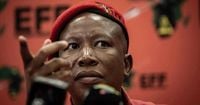On April 28, 2025, Economic Freedom Fighters (EFF) leader Julius Malema called for the resignation of Finance Minister Enoch Godongwana and National Treasury Director-General Duncan Pieterse following a significant court ruling regarding a controversial VAT increase. The Western Cape High Court's full bench set aside the adopted 2025 Fiscal Framework and Revenue Proposals, effectively suspending the planned increase of the Value Added Tax (VAT) from 15% to 15.5%.
The EFF and the Democratic Alliance (DA), both of which had approached the court to challenge Godongwana's VAT increase announcement and the finance committee's report adoption by both Houses, celebrated the court's decision as a victory for the people of South Africa. Malema emphasized that the ruling particularly benefits the poor and working-class citizens who would have been adversely affected by the VAT hike. "This ruling is not just a victory for the EFF — it is a victory for the people of South Africa. It is a victory for the rule of law. It is a victory for the poor and working class, who would have suffered greatly under the VAT increase," he stated.
In light of the court’s decision, Malema demanded the immediate resignation of both Godongwana and Pieterse, asserting that they had demonstrated an inability to formulate a lawful, credible, and developmental Budget. "In light of this decisive judgment, the Economic Freedom Fighters call for the immediate resignation of Finance Minister Enoch Godongwana and National Treasury Director-General Duncan Pieterse. These individuals have proven themselves incapable of formulating a lawful, credible, and developmental Budget," Malema remarked.
The EFF has proposed alternative measures to the National Treasury's austerity-driven framework, advocating for the rejection of the VAT increase, adjustments to personal income tax brackets, an increase in corporate income tax, and the introduction of a Wealth Tax targeting underutilized and luxury landholdings. Malema further stated that a credible third Budget for the 2025/26 financial year must be tabled by no later than July 2025. He expressed the EFF's readiness to engage meaningfully and present substantive proposals aimed at economic recovery, industrialization, mass employment, and the restoration of public services.
Meanwhile, the DA has also lauded the court's decision as a triumph for all South Africans. DA Federal Council chairperson Helen Zille commented, "The passing of the Fiscal Framework through Parliament was unlawful, and the court has found that and that has also been made an order of court. So now the VAT increase won't come into play on May 1, and we can get on with redoing the Fiscal Framework." Zille's remarks highlight the DA's position within the Government of National Unity alongside the ruling African National Congress (ANC), which has faced increasing scrutiny over its handling of fiscal matters.
Despite the court's ruling, Finance Minister Godongwana defended his initial Budget proposal, asserting that it was constitutional and appropriate given the limited options available to address a R75 billion shortfall. He acknowledged the court order but reiterated his stance on the necessity of the VAT increase as a fiscal measure.
The recent developments surrounding the VAT increase have sparked widespread debate on fiscal policy in South Africa. Critics of the proposed VAT hike argue that it disproportionately affects lower-income households, exacerbating existing economic inequalities. Proponents of the increase, however, maintain that it is essential for addressing the nation’s budgetary shortfalls and funding critical public services.
As the political landscape continues to evolve, the EFF's proposals for alternative fiscal measures reflect a growing call for a more equitable approach to taxation and public spending. The party's commitment to advocating for the rights of the poor and working class resonates with many South Africans who have felt the impact of austerity measures in recent years.
The outcome of this legal battle and the subsequent political ramifications will likely influence the upcoming national budget discussions and the broader economic strategy of the government. With the EFF and DA united in their opposition to the VAT increase, the pressure mounts on the ANC to reassess its fiscal policies and engage in more inclusive dialogue with opposition parties.
As South Africa grapples with economic challenges, the implications of this court ruling extend far beyond the immediate suspension of the VAT increase. It raises fundamental questions about governance, accountability, and the role of public policy in shaping the lives of ordinary citizens. The coming months will be crucial as stakeholders from various sectors of society come together to navigate the complexities of fiscal reform and its impact on the nation’s future.




